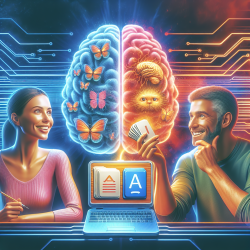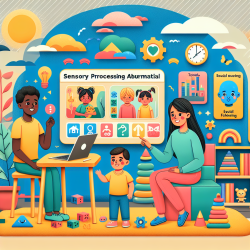Introduction
In the realm of speech-language pathology, Primary Progressive Aphasia (PPA) presents a unique challenge. This neurodegenerative disorder primarily affects language, leaving other cognitive functions relatively intact. Among its subtypes, the semantic variant (svPPA) is particularly daunting, characterized by impaired naming and single-word comprehension. However, recent research provides a beacon of hope. A novel approach using computer-based flashcard software has shown promise in helping patients relearn and retain personally-relevant words. Let's explore how this innovative method can enhance therapeutic outcomes.
The Study: An Overview
The study, "Relearning and Retaining Personally-Relevant Words using Computer-Based Flashcard Software in Primary Progressive Aphasia," conducted by Evans et al., focused on a 72-year-old woman diagnosed with svPPA. The researchers employed Anki, an open-source flashcard program, to facilitate the relearning process. Over 20 months, the patient engaged in independent practice, resulting in significant retention of 139 words out of 591 studied. This outcome is noteworthy, as it surpasses the typical number of words targeted in svPPA interventions.
Key Findings
- Retention and Relearning: The patient successfully retained a large subset of words for up to 20 months. The adaptive scheduling algorithm of Anki played a crucial role in this process, adjusting the review frequency based on the patient's performance.
- Generalization: The study demonstrated limited generalization to perceptually distinct stimuli, suggesting gains in semantic knowledge.
- Patient-Centered Approach: The intervention was tailored to the patient's needs, allowing her to select personally-relevant words and practice independently.
Implications for Practitioners
For practitioners, this study underscores the potential of integrating technology into therapeutic practices. Here are some actionable insights:
- Adopt Technology: Consider incorporating computer-based flashcard software like Anki into your therapy sessions. Its adaptive learning algorithms can enhance word retention.
- Personalization: Encourage patients to select words that hold personal significance. This approach not only boosts engagement but also improves retention.
- Independent Practice: Empower patients to practice independently at home. This not only increases the frequency of practice but also fosters a sense of autonomy and motivation.
Encouraging Further Research
While this study offers promising results, it is essential to continue exploring the efficacy of computer-based interventions in svPPA. Future research should focus on:
- Establishing baseline performance to measure treatment effects more accurately.
- Exploring the impact of treatment in functional contexts, such as daily communication.
- Determining the optimal flashcard set size and practice timing for maximum retention.
To read the original research paper, please follow this link: Relearning and Retaining Personally-Relevant Words using Computer-Based Flashcard Software in Primary Progressive Aphasia.










